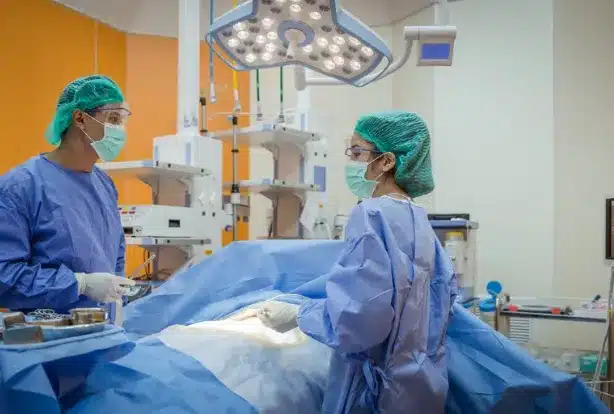General surgery encompasses a broad spectrum of surgical procedures performed by skilled surgeons in specialized operating rooms. This field of medicine focuses on the diagnosis and treatment of a wide range of conditions requiring surgical intervention. Surgeons specializing in general surgery are trained to operate across various anatomical regions and address diverse medical needs within the operating room setting.
History of General Surgery
The roots of general surgery can be traced back to ancient civilizations where basic surgical procedures were performed. However, the modern development of general surgery as a distinct medical specialty can be attributed to advancements in anatomy, anesthesia, and surgical techniques during the 19th and 20th centuries.
The pioneers of general surgery, such as Dr. William Stewart Halsted and Dr. Harvey Cushing, revolutionized surgical practices by introducing techniques like aseptic surgery and surgical residency training programs. These advancements laid the foundation for establishing general surgery as a specialized discipline.
Clinic contact number: +989371200167
Common general surgeries
- Appendectomy: The surgical removal of the appendix, usually performed in cases of appendicitis.
- Cholecystectomy: The surgical removal of the gallbladder, typically done to treat gallstones or gallbladder disease.
- Hernia repair: The surgical correction of a hernia, which occurs when an organ or tissue protrudes through a weak spot in the surrounding muscle or connective tissue.
- Bowel resection: The removal of a diseased or damaged part of the intestine, often performed to treat conditions like colorectal cancer, diverticulitis, or Crohn’s disease.
- Thyroidectomy: The surgical removal of all or part of the thyroid gland, commonly done to treat thyroid cancer, goiter, or hyperthyroidism.
- Mastectomy: The surgical removal of the breast tissue, usually performed as a treatment for breast cancer.
- Colectomy: The removal of all or part of the colon (large intestine), which may be necessary for conditions such as colorectal cancer, diverticulitis, or ulcerative colitis.
- Gastrectomy: The surgical removal of all or part of the stomach, often performed to treat stomach cancer or severe gastric ulcers.
- Hemorrhoidectomy: The surgical removal of hemorrhoids, which are swollen blood vessels in the rectal area.
- Soft tissue surgery: This includes various procedures to remove benign or malignant tumors, cysts, or other abnormalities in soft tissues such as skin, subcutaneous tissue, or muscles.
What Does General Surgery Involve?

General surgery involves the surgical management of a diverse range of conditions affecting various organs and systems of the body, except for the brain, spine, and heart, which specialized surgeons typically treat. General surgeons are trained to perform both elective and emergency surgeries. They employ medical knowledge, surgical skills, and critical decision-making abilities to provide optimal patient care.
Responsibilities of General Surgeons
General surgeons have a wide range of responsibilities, including but not limited to:
Patient Evaluation and Diagnosis
General surgeons are skilled in conducting comprehensive assessments of patients presenting with surgical conditions. This involves:
Comprehensive Assessment
General surgeons are responsible for conducting thorough evaluations of patients presenting with surgical conditions.
Medical History Review
They review patient medical histories to understand underlying health conditions and previous surgical interventions.
Physical Examination
General surgeons perform detailed physical examinations to assess the extent and nature of the surgical problem.
Diagnostic Tests
They order and interpret diagnostic tests such as imaging studies (X-rays, CT scans, MRI), laboratory tests, and endoscopic procedures to aid in diagnosis.
Treatment Planning and Decision-Making
After completing a comprehensive patient evaluation and diagnosis, general surgeons engage in thoughtful treatment planning and decision-making processes to address the patient’s surgical needs effectively. This involves several key steps:
Clinic contact number: +989371200167

Discussing Treatment Options
Surgeons discuss treatment options with patients, including the potential benefits, risks, and alternatives to surgery.
Formulating a Treatment Plan
Based on the diagnosis, general surgeons develop comprehensive treatment plans tailored to each patient’s needs.
Informed Consent
They obtain informed consent from patients after explaining the proposed surgical procedure and associated risks.
Surgical Procedures
- Performing Surgeries: General surgeons perform a wide range of surgical procedures, including but not limited to appendectomies, hernia repairs, cholecystectomies (gallbladder removal), colon surgeries, breast surgeries, and skin lesion excisions.
- Minimally Invasive Techniques: They utilize minimally invasive techniques such as laparoscopy and endoscopy whenever appropriate to minimize surgical trauma and promote faster recovery.
- Emergency Surgery: General surgeons are often involved in emergency surgeries for conditions like appendicitis, bowel obstruction, traumatic injuries, and acute abdominal pain.
Postoperative Care and Management
- Monitoring Recovery: Surgeons oversee postoperative care and monitor patients for complications in the immediate postoperative period.
- Prescribing Medications: They prescribe appropriate medications for pain management, infection prevention, and other postoperative needs.
- Wound Care: General surgeons provide instructions on wound care and follow-up appointments to ensure proper healing.
- Complication Management: If complications arise after surgery, they initiate timely interventions and collaborate with other specialists as needed.
Collaboration and Multidisciplinary Care
- Consultation and Referral: Surgeons collaborate with other specialists (such as oncologists, gastroenterologists, or radiologists) for comprehensive patient care.
- Team Coordination: They work closely with nurses, anesthesiologists, and other healthcare providers to ensure optimal surgical outcomes.
- Patient Education: General surgeons educate patients and their families about the surgical process, recovery expectations, and lifestyle modifications.
Continuous Professional Development
- Staying Updated: Surgeons engage in continuous learning and professional development to stay updated on the latest advancements in surgical techniques, technologies, and patient care.
- Maintaining Certification: They maintain board certification and fulfill continuing education requirements to ensure competency and adherence to professional standards.
Research and Quality Improvement
-
- Clinical Research: Some general surgeons engage in clinical research to contribute to the advancement of surgical knowledge and practices.
- Quality Improvement Initiatives: They participate in quality improvement initiatives aimed at enhancing patient safety, outcomes, and overall healthcare delivery.

Education and Training
To become a general surgeon, an individual must undergo extensive education and training. The journey typically begins with a bachelor’s degree in pre-medical studies or a related field. Subsequently, aspiring surgeons attend medical school, which typically lasts for four years, to earn a Doctor of Medicine (M.D.) or an equivalent degree.
Lipomatic surgery, or liposculpture or liposuction, is a cosmetic procedure that has gained significant popularity in recent years. This innovative technique allows individuals to achieve a more refined and contoured body shape by removing excess fat deposits from specific areas. This article will explore the different types of lipomatic surgery, the process involved, the ideal candidates for the procedure, and its potential benefits.
After completing medical school, individuals interested in general surgery must complete a residency program. General surgery residencies generally last five to seven years, during which aspiring surgeons receive comprehensive training in the specialty’s clinical and surgical aspects. Residents rotate through various surgical subspecialties, gaining exposure to different surgical techniques and patient populations.
Despite the term “general”, surgeons that practice general surgery are highly skilled surgeons that typically operate on common abdominal complaints including appendicitis, hernias, gallbladder surgeries, stomach, and intestinal issues. Very well health.
Leadership in General Surgery
General surgery, a cornerstone of surgical practice, has been shaped by the contributions of notable figures and institutions. Dr. William Stewart Halsted, a pioneer in modern surgical techniques, made significant advancements in aseptic technique and training at Johns Hopkins Hospital, establishing it as a leading center for surgical education. Other prominent universities renowned for their contributions to general surgery include Harvard Medical School, where Dr. Harvey Cushing revolutionized neurosurgery, and the Mayo Clinic, known for its innovative approach to multidisciplinary patient care.
In recent years, hospitals like Massachusetts General Hospital (MGH) have emerged as leaders in general surgery, performing a wide range of procedures from minimally invasive techniques to complex surgeries. MGH is recognized for its excellence in surgical outcomes and patient care, drawing on the expertise of renowned surgeons and cutting-edge research facilities.
Statistics from organizations like the American College of Surgeons indicate a steady increase in the number of general surgical procedures performed annually, reflecting advancements in surgical techniques and technologies that have improved patient outcomes and recovery times. General surgery continues to evolve, driven by ongoing research and collaboration among leading institutions and healthcare professionals.
Clinic contact number: +989371200167
Significance of an Adequate Number of General Surgeons in Hospitals
The number of general surgeons required in a hospital depends on several factors, including the size of the hospital, patient volume, and the complexity of surgical cases. Having an adequate number of general surgeons is crucial for several reasons:
- Timely access to care: Sufficient general surgeons ensures that patients requiring surgical interventions can receive timely treatment, reducing waiting times and improving patient outcomes.
- Emergency response: Hospitals must have an appropriate number of general surgeons available around the clock to handle emergency cases promptly. This is especially critical in trauma centers where rapid surgical intervention can be lifesaving.

summary
In conclusion, general surgery remains a cornerstone of modern medical practice, with surgeons continuously advancing their skills and techniques to deliver optimal patient outcomes. The integration of laparoscopic and robotic surgery has revolutionized the field, allowing for minimally invasive procedures with reduced recovery times and improved precision. Surgical oncology within general surgery underscores the critical role of surgeons in diagnosing and treating cancer, highlighting the ongoing commitment to innovation and excellence in this vital area of healthcare.
FAQs
- Can general surgeons perform brain surgery?
No, general surgeons do not typically perform brain surgery. Brain surgery falls under the domain of neurosurgeons, who specialize in surgical procedures involving the brain, spine, and nervous system.
2. Do general surgeons perform cosmetic surgeries?
While some general surgeons may have training in cosmetic procedures, the majority of cosmetic surgeries are performed by plastic surgeons who have specialized training in aesthetic and reconstructive surgery.
3. What training do general surgeons undergo?
General surgeons undergo extensive medical training, including medical school followed by a surgical residency program typically lasting 5 years. Some surgeons may also pursue additional fellowship training in specific areas such as trauma surgery, critical care, or surgical oncology.
4. When should someone see a general surgeon?
You may be referred to a general surgeon by your primary care physician or another specialist if you have a condition that requires surgical intervention or if you need an evaluation for a surgical problem. Common reasons include persistent abdominal pain, suspected appendicitis, hernias, gallbladder disease, or concerns related to breast masses or skin lesions.
5. What can I expect during a consultation with a general surgeon?
During your consultation, the surgeon will review your medical history, perform a physical examination, and discuss your symptoms and concerns. Diagnostic tests such as imaging studies (like ultrasound, CT scan) or lab tests may be ordered. The surgeon will explain the diagnosis, discuss treatment options (including surgery if needed), and answer any questions you have.
What Is the General Surgery Specialty? (verywellhealth.com)



